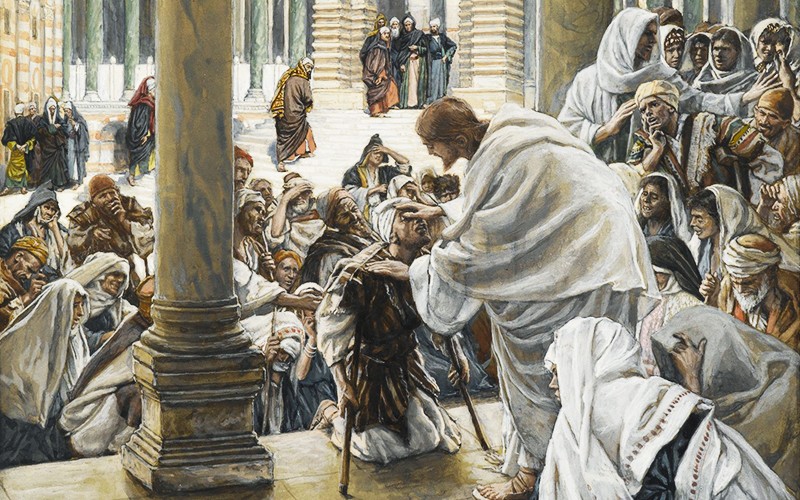How Should We Exercise Our Faith?
Through the teachings of Jesus, learn how to practice your Faith and what its benefits for society are.
Have you ever thought about what exactly it means to have Faith? As the dictionary defines it, Faith is “a strong feeling of trust or confidence in someone or something.” However, an important clarification is necessary: Faith is not limited to the spiritual and religious field.
By diligently performing any task (whatever the area of activity), believing that we are going to complete it in the best way possible, or when we establish a goal to which we dedicate ourselves, we are moved by Faith, in other words, by this confidence.
With regard to its importance in overcoming the challenges of everyday life, Jesus taught in His Gospel according to Matthew 17:20 that
“If you have faith as small as a mustard seed, you can say to this mountain, ‘Move from here to there,’ and it will move. Nothing will be impossible for you.”
Faith thus becomes an indispensable attribute that impels us to achieve what we aspire to.

It is important to point out that the teachings of Jesus, who persevered to the end, are pragmatic, because He always demonstrated His Unshakeable Faith in God through caring for the spiritual and human beings.
His Gospel is filled with passages in which He Himself, seeking to develop this virtue that is inherent in every creature on Earth or in Heaven, exalts people’s Faith as being an essential element for the countless healings and miracles He performed—in addition to many others that were not recorded in the Holy Bible (The Gospel of Jesus according to John 20:30).
One example of that was noted by Mark the Evangelist (5:25-34), when the Divine Master heals a woman who had been subject to bleeding for twelve years and who had not managed to recover her physical health, despite having spent all she had.
The most relevant point of this narrative is found in verse 34, in which Jesus reveals to that woman (and also to the crowd attentively watching that scene) the key to achieve what she had been seeking for such a long time, when He said:
“Daughter, your Faith has healed you. Go in peace and be freed from your suffering.”
It is by this example of great fraternity that the Religion of God, of the Christ, and of the Holy Spirit1 is inspired in order to present its ecumenical view of a belief in something superior to us, because Faith is the force we need to overcome the impossible; it is what motivates us not to give up when we suffer; it is what makes us believe that the victory of Goodness will come.
Accomplishing Faith

Título da Obra: Ele cura o coxo.
The Religion of Universal Love brings us two important guidelines as to the characteristics of the Faith we need to nurture. One of them is the urgency of learning how to educate and channel our Faith in Goodness, so that it will result in positive actions to Humanity and to the planet that, without distinction, shelters us all.
That is why its unrestrictedly ecumenical doctrine is based on the lessons of Jesus, the Ecumenical Christ, the Heavenly Statesman, because He is the most expressive personality that the world has ever known and whose legacy, when understood in its real and sublime dimension and scope, transcends the religious field.
Another essential guideline is that our Faith cannot be an idle faith. On the contrary, it must be a powerful instrument that leads us to carry out Good Deeds, which were greatly encouraged and exemplified by the Divine Shepherd of our Souls, Jesus.
The President-Preacher of the Religion of the Third Millennium, José de Paiva Netto, based on this belief, presents us with the Accomplishing Faith, an exercise in trusting in a Superior force (motivated by Goodness, by the solidary example of Christ) and doing our part.
With regard to this Faith, he explains in his book Sagradas Diretrizes Espirituais da Religião de Deus, do Cristo e do Espírito Santo [Sacred Spiritual Guidelines of the Religion of God, of the Christ, and of the Holy Spirit], volume 1:
“It is the Faith that rises against selfish faith. Accomplishing Faith, as the name itself says, is the stage that leads humanity to the practical aspect of Faith, promoting the union proposed by Reasoning Faith. It makes human beings understand that, from the daily experience of the Religion of Universal Love, by the conscious and dynamic relationship of the Invisible and Visible Worlds, solutions for its progress emerge in the various social fields, whether in Religion, Politics, Economics, Science, Philosophy, Sport, Art, domestic life, etc.”
“The Progressive and Divinizing Stages of Faith”
Accomplishing Faith is part of “The Progressive and Divinizing Stages of Faith,” as proclaimed by the Religion of the Third Millennium, which demonstrate the journey of humanity in the better understanding and fulfilment of the God’s Laws. The Stages were registered by Paiva Netto in the aforementioned book:
“1) Reasoned Faith (Allan Kardec);
2) Reasoning Faith (Alziro Zarur);
3) Accomplishing Faith (Paiva Netto); and
4) Divinizing Faith (Paiva Netto).”
Brought to us by Kardec, “Reasoned Faith opposes blind faith,” the author explains. About Reasoning Faith, he clarifies: “Zarur applied dynamics to Reasoned Faith and took his understanding of it to the people, however simple they were, thereby enabling them to go into the lessons of the Gospel-Apocalypse of Jesus in more depth and to study the existence of the Spiritual World and the beings who live there. He therefore proposes the Union of the Two Humanities, that of the Spiritual World with that of the material world.”
The Divinizing Faith, in its turn, “is the crowning point of the evolution of the Invisible and Visible Humanities. It is integration into God, who is Love; therefore, Charity.”
Faith as an Instrument of Solidarity

This concept relating to pragmatism and, therefore, to Good Deeds, which we must do when expressing our Faith, is also backed by the warnings of the Apostle James who, inspired by Jesus, wrote in his Epistle 2:14 and 17:
“What good is it, my brothers and sisters, if someone claims to have faith but has no deeds? Can such faith save them? . . . . In the same way, faith by itself, if it is not accompanied by action, is dead.”
Therefore, this absolute trust is the basis for a change in our actions. It is the inspiration, the instrument for putting Solidarity into practice.
“Faith alone cannot (fully) satisfy the Divine Law, for it has to produce beneficial results for Humanity. For example, the consequence of Faith must be a good relationship between creatures. Thus, regardless of the religious tradition we profess or not, through Good Deeds, we shall together build a better world for all. And this, no doubt, is approved by God, who is Love. Therefore, He expects His children to love one another,”
Paiva Netto points out in his article “Faith and Good Deeds,” in which he presents an excerpt from an enlightening radio talk he gave on December 30, 1992.
____________
1 Religion of God, of the Christ, and of the Holy Spirit — also called the Religion of the Third Millennium, and the Religion of Universal Love. This is the Ecumenical Religion of Brazil and the world.



